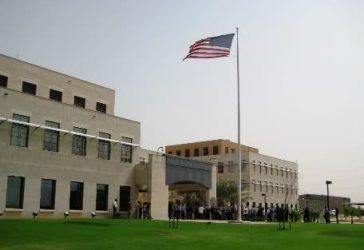Sudanese groups call to protest US Embassy against long-standing sanctions
November 2, 2015 (KHARTOUM) – Several Sudanese civic organizations have called for a march to the United States (US) embassy in Khartoum on Tuesday to protest against 18 years of economic sanctions imposed on Sudan by the American administration.

The protest march which is organized under the title “citizens against sanctions” aims to remind Washington of the disastrous impact of the 18 years of sanctions on the vulnerable segments of the Sudanese society.
The organizers of the march seek to hand over a protest memo to the US embassy officials demanding immediate lift of the sanctions.
In a message to the Congress on 28 October, President Barak Obama extended the national emergency with respect to Sudan for another year. He said
”The actions and policies of the Government of Sudan continue to pose an unusual and extraordinary threat to the national security and foreign policy of the United States,” Obama said.
The White House is expected to announce the extension of sanctions on Sudan Monday or Tuesday.
Last September Sudanese foreign minister said he agreed with his American counterpart to discuss a roadmap for the sanctions removal.
Meanwhile, several national rights groups have developed reports on the negative impact of the unilateral sanctions imposed by the US on Sudan in order to present them to the UN special rapporteur for human rights who will visit Sudan on 23 November.
The head of the National Group for Human Rights (NGHR) Ibrahim Abdel-Halim told the pro-government Sudan Media Center (SMC) that the visit of the special rapporteur is considered a victory to Sudan and the countries which are subjected to sanctions by the major powers.
He said that the NGHR have prepared adequate reports on the negative effects of sanctions on ordinary citizens particularly in the conflict areas besides their impact on the major production schemes.
Abdel-Halim pointed to campaigns carried out by rights groups in international forums regarding the imposition of unilateral sanctions, saying those campaigns yielded the support of groups within the UN to lift those sanctions.
Last August, Sudan lauded inclusion of an item in the UN 2030 Agenda for Sustainable Development preventing member states from applying unilateral sanctions particularly against developing nations.
US administration last month expressed readiness to cooperate with Sudan in the domain of counter-terrorism in order to prevent the flow of extremist groups and foreign fighters into the country.
Also, the US embassy in Khartoum issued a statement on Thursday welcoming Sudan’s removal last week from the list of countries that have deficiencies in their legal and regulatory framework as related to combating money laundering and financing of terrorism.
Sudan has been on the U.S. list of states that sponsor terrorism since 1993, even though the two countries have strengthened their counter-terrorism cooperation since the September 2001 attacks on Washington and New York.
Meanwhile, the state minister of guidance and endowments Nizar al-Jaili al-Mukashfi has demanded the US to lift the economic sanctions imposed on Sudan as soon as possible pointing that it inflicts harm on the Sudanese people.
Al-Mukashfi, who met the US Chargé d’affaires Jerry P. Lanier Monday, hoped that the 2015 US International Religious Freedom Report would be more positive and objective with regard to the religious freedoms in Sudan and reflects the religious tolerance and coexistence between Muslims and Christians in Sudan.
He said in a press release Monday that Sudan looks forward to having relations with the US that are characterized by mutual respect, pointing the government observes the rights of non-Muslims and seeks to implement human justice as required by Islam.
The Sudanese minister added that rights and duties in Sudan are based upon citizenship according to the constitution, calling for cooperation between Khartoum and Washington in the domain of religious freedoms and human rights in order to achieve a common view to promote the work in this regard.
For his part, Lanier expressed his country’s willingness to cooperate with Sudan in the field of religious freedoms and human rights, praising efforts of the Sudanese government to conduct the national dialogue.
He pointed that the exchange of views and ideas would enhance rapprochement between the two governments and peoples.
(ST)
